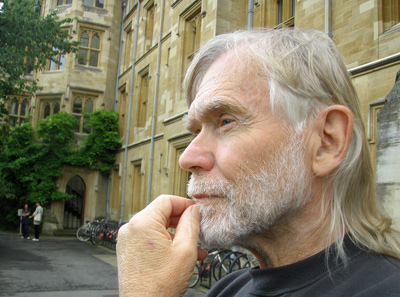
Dr. Richard Paul was Director of Research and Professional Development at the Center for Critical Thinking, and was Chair of the National Council for Excellence in Critical Thinking. His body of work, including eight books and over 200 articles, established him as an internationally-recognized authority on critical thinking. In addition to writing books for every grade level, he experimented extensively with teaching tactics and strategies, and with devising (among other things) novel ways to engage students in rigorous self-assessment.
Dr. Paul received four degrees and gave lectures on critical thinking at many universities in both the United States and abroad, including Harvard, the University of Chicago, the University of Illinois, and the universities of Puerto Rico, Costa Rica, British Columbia, Toronto, and Amsterdam. He taught beginning and advanced courses in critical thinking at the university level for over 20 years.
Paul received numerous honors and awards in his lifetime, including Distinguished Philosopher (Council for Philosophical Studies, 1987), O.C. Tanner Lecturer in Humanities (Utah State University, 1986), Lansdown Visiting Scholar (University of Victoria, 1987), and the Alfred Korsybski Memorial Lecturer (Institute for General Semantics, 1987). His views on critical thinking have been canvassed in the New York Times, Education Week, The Chronicle of Higher Education, American Teacher, Reader’s Digest, Educational Leadership, Newsweek, and U.S. News and World Report. Dr. Paul’s wide-ranging knowledge, practical strategies, and enthusiasm made him highly sought-after as a presenter and keynote speaker.
See our Memorial Page for Dr. Richard Paul.
{"id":"2439","title":"","author":"","content":"<p><img style=\"float: right;\" src=\"https://www.criticalthinking.org/image/pimage/Richard_Paul_Oxford-08.jpg\" alt=\"\" /></p>\r\n<p class=\"F2\"><span style=\"font-family: Arial, Helvetica, sans-serif;\">Dr. Richard Paul was Director of Research and Professional Development at the Center for Critical Thinking, and was Chair of the National Council for Excellence in Critical Thinking. His body of work, including eight books and over 200 articles, established him as an internationally-recognized authority on critical thinking. In addition to writing books for every grade level, he experimented extensively with teaching tactics and strategies, and with devising (among other things) novel ways to engage students in rigorous self-assessment. </span></p>\r\n<div>\r\n<div>\r\n<p><span style=\"font-family: Arial;\"> Dr. Paul received four degrees and gave lectures on critical thinking at many universities in both the United States and abroad, including Harvard, the University of Chicago, the University of Illinois, and the universities of Puerto Rico, Costa Rica, British Columbia, Toronto, and Amsterdam. He taught beginning and advanced courses in critical thinking at the university level for over 20 years. <br /><br />Paul received<span style=\"color: black;\"> numerous honors and awards in his lifetime, including Distinguished Philosopher (Council for Philosophical Studies, 1987), O.C. Tanner Lecturer in Humanities (Utah State University, 1986), Lansdown Visiting Scholar (University of Victoria, 1987), and the Alfred Korsybski Memorial Lecturer (Institute for General Semantics, 1987). </span></span><span style=\"color: black; font-family: Arial;\"><span style=\"color: black;\"> </span></span><span style=\"font-family: Arial,Helvetica,sans-serif;\">His views on critical thinking have been canvassed in the <em>New York Times, Education Week, The Chronicle of Higher Education, American Teacher, Reader’s Digest, Educational Leadership, Newsweek,</em> and<em> U.S. News and World Report</em>. Dr. Paul’s wide-ranging knowledge, practical strategies, and enthusiasm made him highly sought-after as a presenter and keynote speaker.</span></p>\r\n<p><span style=\"font-family: Arial,Helvetica,sans-serif;\"><span style=\"text-decoration: underline;\"><strong><a title=\"Richard Paul Memorial Page\" href=\"https://www.criticalthinking.org/pages/richard-paul-memorial/1231\" target=\"_blank\">See our Memorial Page for Dr. Richard Paul.</a></strong></span><br /></span></p>\r\n</div>\r\n</div>\r\n<p> </p>","public_access":"1","public_downloads":"1","sku":"","files":[],"images":[]}
Additional Bio Info on Richard Paul
For more information on the work of Dr. Richard Paul, download the file at the following link:
{"id":"2442","title":"Additional Bio Info on Richard Paul","author":"","content":"<p>For more information on the work of Dr. Richard Paul, download the file at the following link:<br /> <br style=\"clear: both;\" /></p>","public_access":"1","public_downloads":"1","sku":"","files":[{"id":469,"filename":"data/pages/37/ff640b6d016307b54cad91e5a9d4edfd4f18adb74215a.pdf","realfilename":"data/pages/37/ff640b6d016307b54cad91e5a9d4edfd4f18adb74215a.pdf","title":"Richard Paul Biographical Information","order":0}],"images":[]}
Logic as Theory of Validation: An Essay in Philosophical Logic
Dr. Richard Paul's Dissertation, University of California at Santa Barbara, 1968
{"id":"2443","title":"Logic as Theory of Validation: An Essay in Philosophical Logic","author":"","content":"<p>Dr. Richard Paul's Dissertation, University of California at Santa Barbara, 1968<br style=\"clear: both;\" /></p>","public_access":"1","public_downloads":"1","sku":"","files":[{"id":677,"filename":"data/pages/68/b432faa2ecc2eafae748100bcca9ddda534430d2d9d65.pdf","realfilename":"data/pages/68/b432faa2ecc2eafae748100bcca9ddda534430d2d9d65.pdf","title":"Abstract from Dr. Paul's Dissertation","order":0},{"id":"498","filename":"data/pages/40/8e6c9549935e9c3ef37a7676f696a978508f24602c8fc.pdf","realfilename":"data/pages/40/8e6c9549935e9c3ef37a7676f696a978508f24602c8fc.pdf","title":"Dissertation","order":1}],"images":[]}
